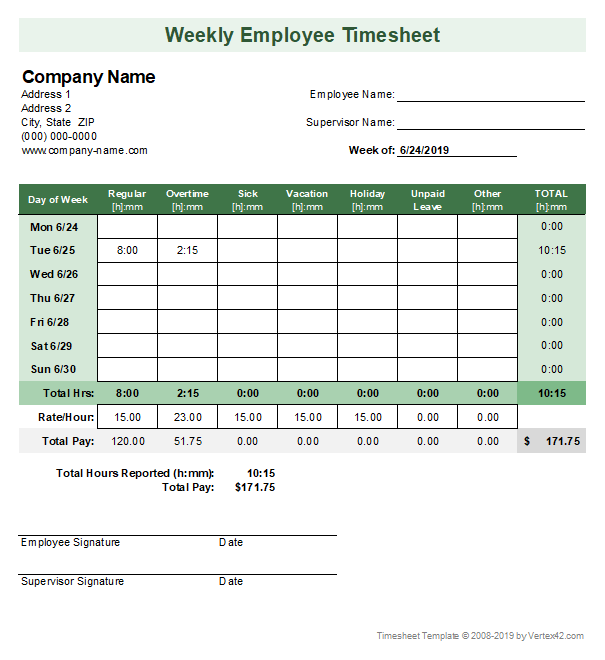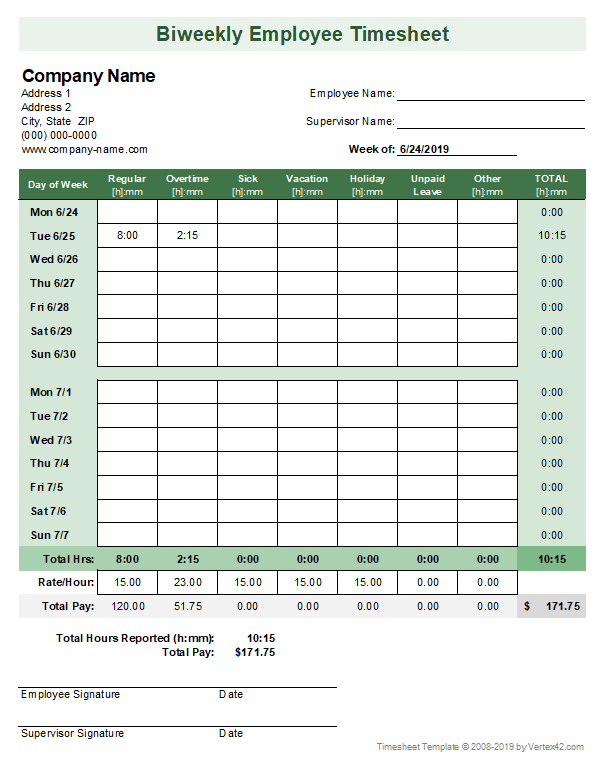
A timesheet template provides a simple and free time tracking solution for new businesses. There is no need to make your own timesheet or install and learn new time-tracking software. Simply download and customize our free timesheet for Excel, OpenOffice or Google Sheets. You can also create an effective online time sheet solution by privately sharing a timesheet with your employees via OneDrive, Google Drive, DropBox, etc.
AdvertisementThe timesheet template on this page is ideal for companies that need to report hours worked, but don't need to report clock in/out times. To record in/out times and have Excel calculate hours worked, try our Time Sheet with Breaks or the Time Card Calculator. To keep track of hours worked on specific projects, try the Timecard template. If you want your employees to use printable time sheets, our templates can be modified easily for printing blank forms.

This weekly timesheet lets you enter times in h:mm format or decimal format (a separate worksheet for each option). You can enter pay rates to calculate the total pay.
License: Private Use (not for distribution or resale)
"No installation, no macros - just a simple spreadsheet" - by Jon Wittwer
Advertisement
This biweekly timesheet provides the same options as the weekly version. The only difference is that it's designed for a two-week period.
License: Private Use (not for distribution or resale)
AdvertisementThis older/original version is provided for those still using Excel 2003. Note: The newer XLSX versions above are also compatible with OpenOffice, so a separate download for OpenOffice isn't really necessary.
License: Private Use (not for distribution or resale)
Sending the Timesheet as a PDF: A great way to send the completed timesheet to your manager (besides printing) is to first save as a PDF and then email the PDF. You can create a PDF with Excel by going to Save As and choosing PDF from the list of file types.
related blog articles
How to Use a Timesheet Template in Your Business - Share your experience and give feedback.
[h]:mm vs. Decimal Formats: Each of the templates contains a separate worksheet tab for entering times using either h:mm or decimal format.
The h:mm time format is the simple for the employee to use because most people think of time in hours and minutes. If you allow employees to enter times rounded to the minute or 5 minutes, use the h:mm format.
The decimal hour format works fine if you are rounding to the nearest 15 minutes. For example, 30 minutes is entered as 0.5, 15 minutes is entered as 0.25, and 45 minutes is entered as 0.75.
Update Company Information: After deciding what time format to use, update the Company information, and customize the timesheet as needed. If you don't need the signature lines, you can delete those rows.
Overtime Hours: You can assign a separate pay rate for regular hours and overtime hours. You may want to add custom notes to the timesheet to explain policies for overtime, vacation, etc. You could do this by adding notes to the column labels, or putting the information into the sidebar.
Optional Rate & Pay Information: If you only need to keep track of hours, or if you are using printed blank timesheets, you can delete the rows that contain the rate and pay information.
Ink-Friendly Design: If you are concerned about using too much colored ink when printing timesheets regularly, you can remove the background colors and change font colors to black.
You can easily print this timesheet for employees to fill out by hand, but it can also be used as an electronic timesheet. An electronic timesheet is a time tracking solution that uses software to track and report time. If card-swipe time clocks are not used, an employee might log into a website to enter their time.
The main advantages of using an electronic or online solution for time tracking are: 1) timesheets can be easily accessed by both the employer and employee, 2) the electronic timesheet handles all the time and pay calculations, 3) employees may work remotely, 4) the payroll process is streamlined.
Note: It is a violation of copyright to share the template publicly or to add a copy to a public template gallery, but sharing it with an employee is allowed.
For Employers/Managers: The system you use to report and record the hours is up to you. It could involve printing a copy of the spreadsheet or having the employee export a copy of the completed document and email it to you. Or, you could simply log into Google Sheets, look at the completed documents, and record the hours in your payroll spreadsheet. The procedure I use is to save a copy (exported to an Excel file that I save on my computer), and then clear out the hours and update the date in the Week Of field. That is the signal to the employee that the document is ready to be updated for the next pay period.